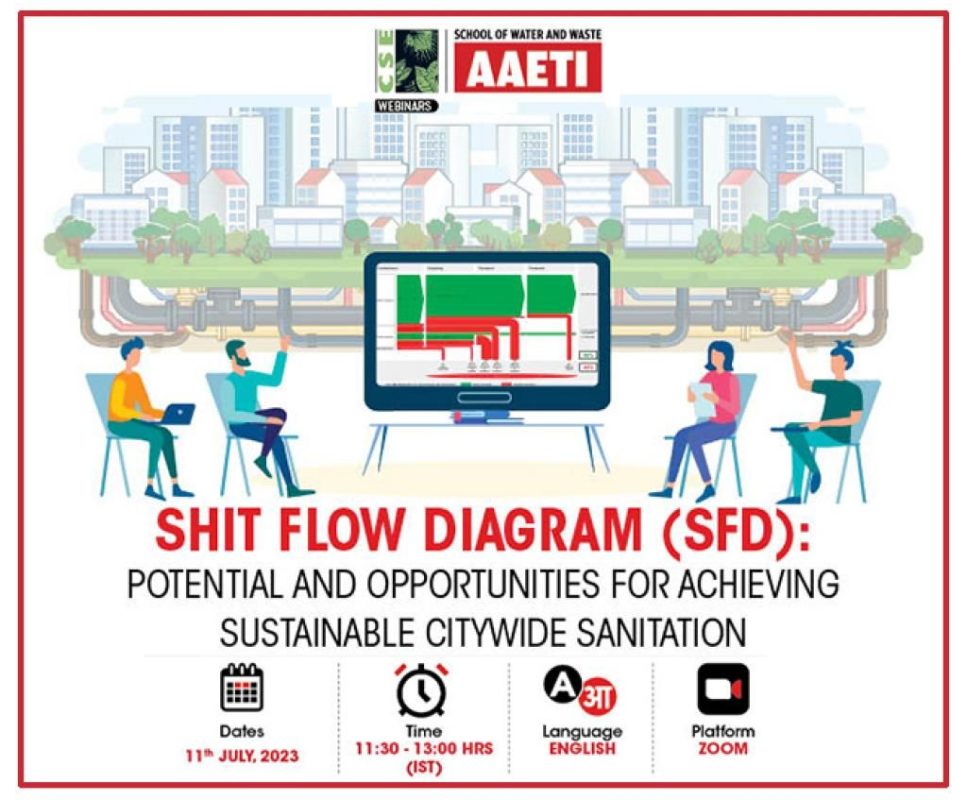SFD-Potential and Opportunities for Achieving Sustainable Citywide Sanitation: CSE

![]()
Date : 11th July 23 / Time: 11:30 – 13:00 / Platform: Zoom
The Centre for Science and Environment (CSE) is a public interest research and advocacy organisation based in New Delhi. CSE researches into, lobbies for and communicates the urgency of development that is both sustainable and equitable. The scenario today demands using knowledge to bring about change. In other words, working India’s democracy. This is what we aim to do.The challenge, we see, is two-pronged. On the one hand, millions live within a biomass based subsistence economy, at the margins of survival. The environment is their only natural asset. But a degraded environment means stress on land, water and forest resources for survival. It means increasing destitution and poverty. Here, opportunity to bring about change is enormous.But it will need a commitment to reform – structural reform- in the way we do business with local communities. On the other hand, rapid industrialization is throwing up new problems: growing toxification and a costly disease burden. The answers will be in reinventing the growth model of the Western world for ourselves, so that we can leapfrog technology choices and find new ways of building wealth that will not cost us the earth. Our aim is to raise these concerns, participate in seeking answers and in pushing for answers, transforming these into policy and so practice. We do this through our research and by communicating our understanding through our publications. We call this knowledge-based activism. We hope we will make a difference.
CSE with its experience of developing and in conducting SFD trainings in India and Africa and Asia, has put together this Webinar of experts for sharing their practical experience in developing SFDs in Asia, Africa and India.
Shit Flow diagrams (SFDs) have proved to be useful advocacy and planning tool for urban sanitation.
As advocacy tools, SFDs have helped forge an understanding of the sanitation service value chain, its different components from containment to conveyance and treatment or the lack of it. Hence focusing attention on the scale of the urban sanitation challenges for Policy makers.
As an urban sanitation planning tool, SFDs have helped municipal officials in mapping and identifying different sanitation systems (sewered and non sewered) potential in cities, and identifying interventions for improving sanitation outcomes
Aim
To understand how SFDs have been prepared and used internationally as well as in India. This will be of particular relevance to practitioners and trainers engaged in urban sanitation.
TARGET AUDIENCE
- Managers, regulators, officials of water and wastewater utilities; Mid-to-senior level technicians working in NGOs, statutory bodies, government agencies and private sector.
- Individual practitioners/ consultants, researchers, academia with prior basic knowledge or relevant experience working in water and sanitation sector
FOR MORE INFORMATION, KINDLY CONTACT
WEBINAR COORDINATOR
HARSH YADAVA
Programme Officer
Water Programme, CSE
Email: harsh.yadava@cseindia.org
Mob No: +91 8709638775

